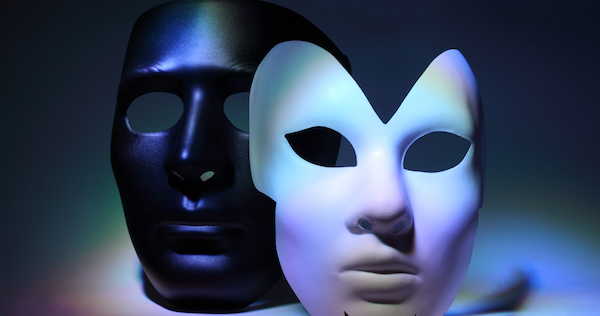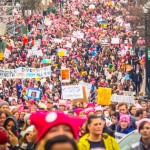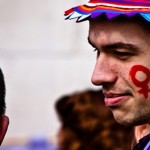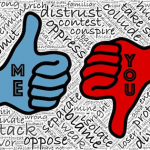
KERRY CONNELLY, blogger at Jerseygirl, Jesus (Progressive Christian): Hi Samar! Hi Rebecca! What are we talking about today?
SAMAR KAUKAB, executive director of Arete at the University of Chicago (Muslim): I really liked the suggestion about silences and what we ‘get to’ speak about and what we don’t. Would love to hear more about your experience, Kerry.
Kerry: Yes, I am really admittedly angry about it. I wrote a post on my blog called An Apology To Black Women. I wrote it because in my social media feed after the Golden Globes, so many of my black friends were calling out Meryl Streep while white women were applauding her. As I thought back over conversations I’ve had, or witnessed on social media, I’ve learned that many women of color feel left behind by white feminism (or mainstream feminism) and a simple Google search explains why. So I wrote a blog post. It got a lot of positive attention in many places I posted it on social media. But one Christian women’s group censored it, saying it was offensive. Someone commented on that by saying the most segregated place is Church on Sunday mornings. I know I was frustrated by my own church’s unwillingness to speak about race issues after the election.
Samar: What was seen as offensive? I’m really interested in this as well based on recent conversations I’ve had (as well as listened to) about identity and when people see discussions about it as inclusive vs. exclusive. Obviously this has some relevancy to the upcoming Women’s March as well. What are all of your thoughts on that?
REBECCA BRATTEN WEISS, blogger at Suspended in her Jar (Catholic): I am frustrated beyond belief with the way most of my religious leaders address race issues: that is, not at all. The best I can usually hope for is a benign silence, but given how many Catholic leaders were vocal and enthusiastic in their support of Trump last year, it is difficult for me to believe that they aren’t worse than indifferent. I have seen so many instances of Catholic opinion-makers arguing that “racism doesn’t exist anymore” or “Black Lives Matter is a hate group.” The alliance of my faith tradition with white capitalism is really contrary to the values that keep me here — the values Jesus taught in the Gospels, and which Pope Francis largely upholds.
Kerry: I LOVE POPE FRANCIS! Coming out of the Evangelical world, boy can I understand what you mean about white capitalism. Eeessh.
What “they” “say” they found offensive was that “not all black people feel like that”. But what bothers me about this — and I do mean it bothers me a lot — is that the message came from a white woman. She said she was speaking for all the admins of the group, and “even the black admin thought it was offensive, and so did the white feminist admin who has a lot of black friends.”
I just simply don’t trust that one white woman could honestly be speaking for so many black ones, and on top of that, was assuming that the 2700 members of that Facebook group would all agree. When I pushed back and asked her to let the post stand so we could have a nice, healthy conversation about it, she never responded. It was outright censorship.
And I have to say, I do feel as if this happens in churches all the time. Especially for people who are in leadership positions, volunteer or otherwise. We are told to keep the peace, to not be divisive. It’s a big part of why I chose to leave my job at the church. I wanted to start using my voice.
Samar: It’s interesting to hear various perspectives of how race is spoken about — or not at all — in different religious communities. American Muslim communities aren’t unique in that we also struggle a lot with race issues, particularly given the diversity represented within our communities as well how these various communities stratify based on race/class, etc.
But at the same time, the vast majority of American Muslims are people of color. Many Muslims are not only targeted for being Muslim, they’re also targeted for being black or brown. On top of that, add the complexity of being a woman and…well, yeah. One of the things I see our communities struggle with might be a little different. I hear a lot of questions being asked about which values get prioritized and which parts of our identity get prioritized, and at the expense of what? So while the majority of the community might buy in on defending Muslim civil liberties particularly given the upcoming Administration, does the community also support women’s rights, or Black Lives Matter? Not always. These are really important questions and inconsistencies that are often completely maddening.
Kerry: The intersectionality of these issues is incredibly complex. It’s complex in the world of Christianity, but I can only imagine how much more so in the Muslim world given the recent rhetoric. Meanwhile, Christians are faced with asking ourselves how we are going to respond to those issues as well. And while many of my friends have made me so proud, so many more have disappointed me.
Samar, do you think immigration plays a role in the complexity? Many Muslims coming from different countries and cultures…how do you think that plays into it?
Samar: It does play a significant role. A large percentage of the American Muslim population either are recent immigrants themselves or come from families in which the immigrant experience is recent. At the same time, we have a significant percentage of the population that isn’t represented by the immigrant narrative. A third of American Muslims are African American. This isn’t often represented in popular narratives about the Muslim experience in America. And so, the conversations we are experiencing within our communities are fascinating, troubling, and also very hopeful. Who gets to speak on behalf of whom, and can we speak about ourselves in ways that represent our entire identities versus just pieces of them? And can we create a narrative that allows us to not only do that but also communicate that separating out our complex identities is actually harmful?
Rebecca: It’s impossible to look at this question without acknowledging the phenomenon of power — which goes back to Kerry’s initial experience, an experience women often have of being silenced or corrected when we speak in ways that might cause discomfort to those who command the narrative. The ones in control want to keep the narrative monolithic, linear (phallic, really) – because allowing for different voices may not necessarily challenge what they are saying, directly. But it DOES challenge the idea that they’re the ones best suited to saying it. I look even at how our American history gets rewritten (and that plays into the immigration thing) so that most of us, who were once immigrants, now pretend to be natives protecting our space. It’s patently absurd, but it’s a way not only of protecting what we have to say, but protecting our sense of being the ones privileged enough to say it. Which is why you get so much white-splaining of the black experience, I guess?
Kerry: Rebecca, I am woo-hooing over here!! I want to take your last paragraph and hang it on my wall. It is so incredibly true. Lately, and I think we touched on this in our last conversation, I feel a great responsibility to begin this conversation among white people. Our privilege makes it easy for us to never really have to bother with race issues if we don’t want to. But we need to be a huge part of the solution. That can’t happen if we’re not talking about it. And I’m really over whether or not that makes people uncomfortable. The situation is too dire to worry about people’s comfort.
Rebecca: That is so true! What do we do with the fact that people just won’t even begin to acknowledge that race is important? This interests with feminism, too. People have just been trained in certain circles to be blind to injustice. How do we make them uncomfortable in a way that wakes them up? Or is it necessary to wake them up, or do we just let them wallow in their bubbles, and move forward ourselves?
Samar: Rebecca, I think what you raise regarding the phenomenon of power is absolutely critical. One of the questions that often gets raised by those of us who see ourselves of feminists of color centers around this idea about can we become more than mere peripheral interlocutors in feminist conversations and actions — or does it make more sense for women of color to move beyond and forward when we are overlooked, unrepresented, and see that our priorities and issues as women are not being spoken to and about? I’m of the opinion increasingly that feminist conversations or conversations about women’s rights that (whether explicitly or implicitly) do not represent the priorities and needs of ALL women are frankly not conversations that I have time for or interest in.
Kerry: I agree Samar. I am all for breaking this barrier for ALL women, and Rebecca’s point about power is SO spot on. And unfortunately, it IS the biggest barrier. People in power, whether they are admins of Facebook groups or whole races or governments or religions or ________________ (fill in the blank) don’t want to give up their power when they have it. It seems like the most threatening thing ever.
And yet, in the Christian faith, it is exactly the thing we are called to do. The first shall be last, the last first. We are called to live a lifestyle of submission to God and to each other, and yet the hairy-chested ones keep grabbing the microphone and telling us to be quiet, because you know. Authority. Sigh.
Samar: I find that to be one of the most frustrating gaps that I see coming from largely male religious leadership in Muslim communities as well. There’s this completely absurd prioritization of religious values that works to reinforce power and authority for those who benefit most from it. Some of the most promising work I see happening amongst Muslim feminists is working with religious text, narratives and shared moral values to reinterpret the way we prioritize what is important to us. Ultimately, the hope being that these values can be more inclusive and representative of the flocks that they are meant to bind.
Rebecca: That’s a great image, of the hairy-chested ones grabbing the microphone. Sometimes I think of making a list of the ways they do that without overtly saying “Hey, female object, be quiet.” Often it’s through a presumption that we’re less educated. Like “Well, you should read X,” when I’ve been reading X for the past 20 years.
Samar, I see something very similar happening. And it’s hard to understand how they reconcile this with a religion that is based on submission to God, as Kerry says….except that authorities cast themselves in the image of God. As religious feminists, I wonder if we need to work to develop scholarship and art that explore more the image of the divine in actual living women (not just some abstract Feminine).
Kerry: Ohhhh I like that idea Rebecca!! Especially because, at least in Christianity, “The Feminine” has this whole madonna/whore thing going on, and in many ways, that ideal keeps the power structure in place. Put her on a pedestal and keep her frail, or put her in the boudoir, and keep her wicked. Either way, she is not powerful over the righteous. So what does a strong righteous woman look like? And if anyone quotes Proverbs 31 I’ll scream, lol.
Rebecca: Well, in our Catholic iconography, Mary is too often represented as pale and frail, but she’s still not helplessly calling on archangels to save her; she’s stomping on the snake herself. Though I like snakes so I prefer to think of her casting down the mighty from their thrones.
Kerry: Haha! Love that.
Okay ladies! I need to run — kids descend upon the homefront soon.
Rebecca: Great talking with you both.
Image via Shutterstock










